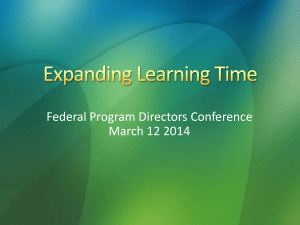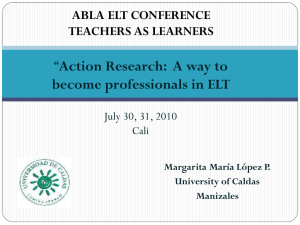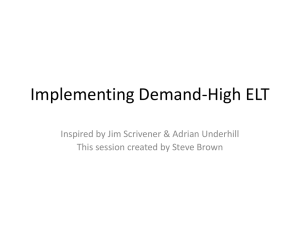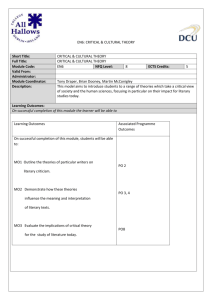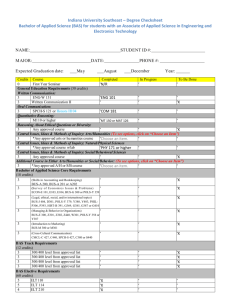Roundtable Discussion Report
advertisement
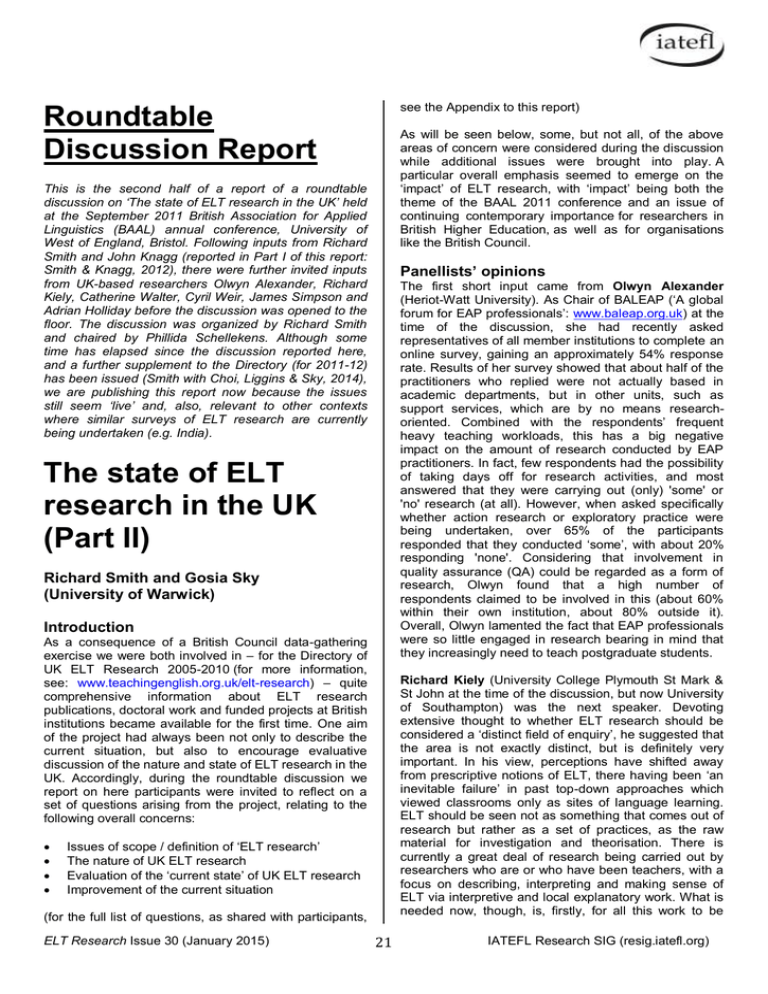
see the Appendix to this report) Roundtable Discussion Report As will be seen below, some, but not all, of the above areas of concern were considered during the discussion while additional issues were brought into play. A particular overall emphasis seemed to emerge on the ‘impact’ of ELT research, with ‘impact’ being both the theme of the BAAL 2011 conference and an issue of continuing contemporary importance for researchers in British Higher Education, as well as for organisations like the British Council. This is the second half of a report of a roundtable discussion on ‘The state of ELT research in the UK’ held at the September 2011 British Association for Applied Linguistics (BAAL) annual conference, University of West of England, Bristol. Following inputs from Richard Smith and John Knagg (reported in Part I of this report: Smith & Knagg, 2012), there were further invited inputs from UK-based researchers Olwyn Alexander, Richard Kiely, Catherine Walter, Cyril Weir, James Simpson and Adrian Holliday before the discussion was opened to the floor. The discussion was organized by Richard Smith and chaired by Phillida Schellekens. Although some time has elapsed since the discussion reported here, and a further supplement to the Directory (for 2011-12) has been issued (Smith with Choi, Liggins & Sky, 2014), we are publishing this report now because the issues still seem ‘live’ and, also, relevant to other contexts where similar surveys of ELT research are currently being undertaken (e.g. India). Panellists’ opinions The first short input came from Olwyn Alexander (Heriot-Watt University). As Chair of BALEAP (‘A global forum for EAP professionals’: www.baleap.org.uk) at the time of the discussion, she had recently asked representatives of all member institutions to complete an online survey, gaining an approximately 54% response rate. Results of her survey showed that about half of the practitioners who replied were not actually based in academic departments, but in other units, such as support services, which are by no means researchoriented. Combined with the respondents’ frequent heavy teaching workloads, this has a big negative impact on the amount of research conducted by EAP practitioners. In fact, few respondents had the possibility of taking days off for research activities, and most answered that they were carrying out (only) 'some' or 'no' research (at all). However, when asked specifically whether action research or exploratory practice were being undertaken, over 65% of the participants responded that they conducted ‘some’, with about 20% responding 'none'. Considering that involvement in quality assurance (QA) could be regarded as a form of research, Olwyn found that a high number of respondents claimed to be involved in this (about 60% within their own institution, about 80% outside it). Overall, Olwyn lamented the fact that EAP professionals were so little engaged in research bearing in mind that they increasingly need to teach postgraduate students. The state of ELT research in the UK (Part II) Richard Smith and Gosia Sky (University of Warwick) Introduction As a consequence of a British Council data-gathering exercise we were both involved in – for the Directory of UK ELT Research 2005-2010 (for more information, see: www.teachingenglish.org.uk/elt-research) – quite comprehensive information about ELT research publications, doctoral work and funded projects at British institutions became available for the first time. One aim of the project had always been not only to describe the current situation, but also to encourage evaluative discussion of the nature and state of ELT research in the UK. Accordingly, during the roundtable discussion we report on here participants were invited to reflect on a set of questions arising from the project, relating to the following overall concerns: Richard Kiely (University College Plymouth St Mark & St John at the time of the discussion, but now University of Southampton) was the next speaker. Devoting extensive thought to whether ELT research should be considered a ‘distinct field of enquiry’, he suggested that the area is not exactly distinct, but is definitely very important. In his view, perceptions have shifted away from prescriptive notions of ELT, there having been ‘an inevitable failure’ in past top-down approaches which viewed classrooms only as sites of language learning. ELT should be seen not as something that comes out of research but rather as a set of practices, as the raw material for investigation and theorisation. There is currently a great deal of research being carried out by researchers who are or who have been teachers, with a focus on describing, interpreting and making sense of ELT via interpretive and local explanatory work. What is needed now, though, is, firstly, for all this work to be Issues of scope / definition of ‘ELT research’ The nature of UK ELT research Evaluation of the ‘current state’ of UK ELT research Improvement of the current situation (for the full list of questions, as shared with participants, ELT Research Issue 30 (January 2015) 21 IATEFL Research SIG (resig.iatefl.org) drawn together, so that the significant messages become more visible. There is then a need for another stage in research which returns to theory development, but this time not with theory coming from a fixed set of ideas such as SLA, for example, but from interdisciplinary perspectives, so that ELT is to be understood as a complex set of practices. Thus, while we are beginning to understand how and why ELT is carried out, with local, social and historical explanatory factors, there is still a gap in terms of theories to explain these practices. funding for current ELT teachers to be more researchactive and for practitioner research. If the theory-practice divide continues, Cyril expressed his worry about the threat to our sector that the current UK higher education research assessment exercise and future ones will pose. He proposed that there is a need for more articles and books that build bridges from research findings to practice. As the recognition of impact in the forthcoming (UK Higher Education) Research Excellence Framework clearly points to the importance of practical outcomes for theoretical research, there is a need for more crossdepartmental initiatives between research units and learning contexts, involving not just university language centres, but also nearby language schools or state schools. Cyril referred to the impact of ELT research as a highly important concern which will determine the future of our sector. It can be divided into 3 levels: civic (impact on the knowledge and skills available in society), economic (impact in terms of the value of work) and impact on research-informed practice (the effect on individuals). In her input, Catherine Walter (University of Oxford) addressed the same issue as Richard Kiely, but from a different perspective. Her main point was that it makes little sense to isolate research on ELT and English language learning from instruction in other languages. On the one hand, she acknowledged that ELT is atypical and specific due to the status of English as a world language (e.g. motivation and attitudes towards learning and teaching English vs. other languages may differ) and the way it is structured (e.g. some ELT research may not be very applicable to research on the teaching of other languages), which warrants the need for research that explores those areas. On the other hand, she felt that the Directories ran the risk of missing valuable insights derived from work on languages other than English, since their scope was limited solely to ELT. She also emphasised that using the term ‘ELT research’ brings a danger of homogenization, obscuring, for example, the distinction between research into English as a foreign language (EFL) and English as a second language (ESL). Despite implications often emanating from the USA that the results of intervention studies in ESL environments can be applied to EFL, she highlighted the dangers of overgeneralisation in this area, even if the entries in the current Directory indicate that this is much less the case in the UK. Instead, a more meaningful division could be between learning a language in a country where it is spoken, as opposed to foreign language learning. At the same time, Catherine thought it was encouraging to see in the Directories that UK research is carried out in a wide range of countries. James Simpson (University of Leeds) talked about research in ESOL (the teaching of English to refugees and immigrants in the UK) and its impact on policy and practice, with reference not only to the huge number of people in need of ESOL classes (e.g. about 600,000 people in London alone), but also to the way research needs to be interdisciplinary. Underlining the challenges that ESOL students as migrants face on a daily basis (such as, unfair social and educational policies restricting students’ access to the type of language education they need to function fully in society), he stated that ESOL research could do much more in terms of impact to bring those issues to light, counter some of the occurring imbalances and promote students’ access to appropriate learning opportunities, which, while at odds with an institutional understanding of impact, aligns with the overall purpose of Applied Linguistics (to act in areas where language is a central issue). While ESOL teachers have always adopted a critical stance towards practice and policies/discourses impinging on that practice, ESOL researchers should work in unison with language teachers to support such an approach. Considering that these are very difficult times for ESOL (teacher job cuts, no funding, campaigns to save the sector etc.), he advocated that there is no better time than now to engage in critical research with an eye on social justice, to critique current policy, and to inform and influence legislators. James’ final remark was that with ESOL being so closely tied up with arguments about migration, asylum, citizenship, social exclusion, economy and globalisation, it should be natural for ESOL research to address both policy and practice, and ESOL practitioners should be encouraged to become both users and producers of research. Cyril Weir (University of Bedfordshire) considered issues of practical outcomes of ELT research, its nature and impact. Eliciting his colleagues’ viewpoints, he had found there was a general consensus that ELT research should have practical outcomes, and that a gap needed to be bridged between academia and the world of the ELT practitioner. Indeed, the gap is so wide and there are seemingly so few people moving these days from ELT practice into academia, that the question needs to be asked ‘Who is actually competent to do ELT research?’. Those on a Higher Education pathway from a first degree to MA and PhD with very little actual English language teaching experience, in CRELLA’s collective view, need to be provided with more training and more classroom practice. Other suggestions included the British Council setting aside specific ELT Research Issue 30 (January 2015) Finally, Adrian Holliday (Canterbury Christ Church University) talked about the type of ELT research conducted in his largely teaching-oriented department, 22 IATEFL Research SIG (resig.iatefl.org) which focuses on impact, teacher development and what they call, ‘sociology of ELT as a profession’ – qualitative investigation of the nature of the profession in terms of its discourse, e.g. globalisation, student identity, politics of prejudice, professional discourses etc., none of which is based on Applied Linguistics. Drawing attention to the difficulty of getting published because there do not seem to be many journals interested in this sort of research, he argued that there needs to be a stronger emphasis on looking at the ELT profession as an educational enterprise from a sociological perspective. As an example, he referred to a recent discussion on the BAAL email discussion list about native/non-native speaker teacher issues, underlining the relevance of the type of research that both students and staff are engaged in in his department. He stressed that research on issues related to professional prejudice can be aligned with mainstream critical qualitative research, itself based on well-established traditions of educational research going back to the 1960s and 1970s. relevant knowledge. Olwyn Alexander responded by drawing attention to a buddying system under discussion within BALEAP whereby an applied linguist will team up with a practising teacher and shared research can be carried out. The researcher needs to see the teacher as an equal, and it is unclear how this might work out in practice. She also highlighted the research training events for EAP practitioners which BALEAP has organized and the way IATEFL Research SIG had joined in with publicity for these. There are ongoing attempts to engage members in action research or exploratory practice but there also difficulties. Moving on from this, there were also suggestions that practitioners could have more of an input into the kind of research that goes on, and that academics should set foot in language classrooms to a greater extent than seemed to be generally the case. While a lack of time on both academic and practitioner sides was acknowledged as one barrier, ideological differences, including those in conceptions of what research ‘is’, were also highlighted as a barrier by one audience participant, Parvaneh Tavakoli (University of Reading), on the basis of her own research. General discussion For the final half hour, discussion was opened to the floor. Overall, as the chair, Phillida Schellekens pointed out at the end, three main areas were addressed by audience members: Attention then turned to whether UK ELT research is distinctive in any way, with Rosamond Mitchell (University of Southampton) pointing out how much relevant research is going on around the world and that there are centres of excellence everywhere. John Knagg responded by saying that the attempt to survey research on a national basis seemed to be unique to the UK and that there was no equivalent survey in the USA, for example, although there was interest in the Directory project when he had given a presentation about it at the 2011 TESOL Convention in New Orleans. There was a general perception in the world that the UK has many centres of excellence in the area of ELT research, particularly as a result of the development of the applied linguistics movement in the 1960s and 1970s. The UK is also perceived internationally as a place where teacher education and academic research come together in a fruitful way. 1) How relevant is UK ELT research to the ELT world? 2) How is quality to be measured? 3) What new directions should be taken? Firstly, with regard to relevance, a lack of UK ELT research related to secondary schooling was highlighted, and it was noted that much research is carried out within or oriented towards higher education. John Knagg (British Council) pointed out that a lot of research, for example into English language, is applicable across levels while agreeing that there is a need for more research that is directed towards secondary and primary levels. Richard Kiely suggested two reasons for the preponderance of research into tertiary contexts apparent from the Directories of UK ELT research: firstly, the ready availability of research participants and, secondly, the way researchers are wishing to engage with problems in their full complexity, which seems to necessitate familiarity with the context under investigation. Funding bodies can and probably should direct research towards secondary and primary school contexts by stating priorities in this area. Finally, Catherine Walter pointed out some of the difficulties of researching school age children, including problems of access and the fact that research tools often need to be specially developed for use with children. In response to this, a suggestion was made from the floor that the UK needed to contribute to the development of centres of excellence in other parts of the world, for example in Africa. Richard Kiely argued that labelling a place as a centre of ‘excellence’ or ‘expertise’ is an evaluative act and that, as he filled in his own entries for submission to the Directory project, he had not been thinking in terms of claim to expertise, but simply in terms of recording or reporting. He felt that the value of the Directory lay in the way it drew together what had been done, providing it with greater visibility, and that this in itself could be of value for other contexts. For example, there is enormous difficulty in accessing research in Africa, and the Directory database can perform a great service to people there. It is also of value in teacher education, but is not valuable as a Taking up the issue of relevance from a different angle, some contributors from the floor highlighted the value of practitioner research and pointed to some of the possibilities as well as constraints of teachers being positioned not just as consumers but as producers of ELT Research Issue 30 (January 2015) 23 IATEFL Research SIG (resig.iatefl.org) statement of excellence. From the floor, Lynda Taylor (University of Bedfordshire) pointed out that although all the research in the Directory had been done by at least one person affiliated with a UK institution, very often the studies are localized, with situated practices being analysed. This is most obviously the case in PhD theses, but also in funded projects. Thus, the designation ‘UK’ ELT research can be misunderstood and we would be wrong to interpret what is in there as necessarily being connected with a UK research site. directory (where there are already suggestions from, among others, Scott Thornbury). References Rixon, S. & Smith, R. (2010). Directory of UK ELT Research 2005-08. London: The British Council. Online: http://www.teachingenglish.org.uk/elt-research Smith, R. with Choi, S., Reid, S., Sky, G. & Hunter, D. (2011). Directory of UK ELT Research 2009-10. London: The British Council. Online: http://www.teachingenglish.org.uk/elt-research Other points discussed included Cyril Weir’s recommendation that to bridge the research-practice divide, position papers could be put on websites as freely available resources, which could enable hit identification/ web traffic measurement, and end-users would get used to the idea of research-related resources being accessible. There was also a suggestion from the floor (Steve Walsh, University of Newcastle) that there is a problem with MA students not carrying on with research after returning to their home countries, to which Richard Smith responded by describing how MA students could be encouraged to join associations like IATEFL, and its Research SIG, to keep in touch with research issues as well as to disseminate their own research insights. Gibson Ferguson (University of Sheffield) made the point that impact can also be negative, with premature application or ‘rushing into impact’ potentially having damaging effects. Catherine Walter concurred with this, citing the way research in tertiary contexts can be inappropriately extended down to children. Finally, Jenny Pugsley (Trinity College London, now retired) asked whether the academic community has an influence on defining the frames of reference for measuring quality of research, or whether there is a one-size-fits-all approach across disciplines. Replying to this, Richard Kiely expressed his concern that we are working with a narrative of research informing practice, whereas in reality ELT practice informs research and practitioners are the ones who are knowledge constructors. So, with regard to impact, the REF exercise is important but narrow from a long-term perspective. The wider frame of impact is that of educational ideas, and we need to place value on the way we constitute a community which is developing educational ideas with a good effect on quality of life but whose impact cannot be easily measured. This was disagreed with by Cyril Weir, who reemphasized the need, from his point of view, for research to have a measurable beneficial impact on society – an impact which he did not see occurring much at present. Smith, R. with Choi, S., Liggins, I. & Sky, G. (2014). Directory of UK ELT Research 2011-12. London: The British Council. Online: http://www.teachingenglish.org.uk/elt-research Smith, R. & Knagg, J. (2012). ‘The state of ELT research in the UK (part I)’. ELT Research 26: 5 –7. Online: http://resig.weebly.com/uploads/8/1/4/0/8140071/panel_ discussion_report_part_1_-the_state_of_uk_elt_research.pdf Appendix Full list of questions for reflection / discussion shared with panellists and audience a. Issues of scope / definition To what extent is it useful/feasible to conceive of 'ELT research' as a distinct field of inquiry? Indeed, what exactly is ELT research? Is the restriction of this [in the Directory project] to research which 'relates directly' to the teaching, learning or assessment of English as a Foreign, Second or Additional Language' too narrow? Who does ELT research? How do some people earn the right to consider themselves ELT researchers rather than simply applied linguists or teachers with classroom ideas to share? b. The nature of UK ELT research What does the British Council’s Directory of UK ELT Research (20052010) tell us about the kinds of research being undertaken in the UK? Do particular kinds of research predominate at the expense of others? How does UK ELT research compare to that undertaken elsewhere? Is UK ELT research distinctive from other countries' ELT research? If it is, in what ways? If not, then what does this signify? c. Evaluation How should we conceive of impact and 'quality' in ELT research? Bearing in mind the probability that assessments of the worth of UK academic departments' research in the forthcoming Research Excellence Framework (‘REF’) [a nationwide assessment of university departments’ research quality, 2008-13] will include up to 20% for 'impact', how do the contents entered in the Directory of UK ELT Research for 2005-2010 seem to measure up in this area? How should 'quality' otherwise be measured in ELT research? What is the actual quality as well as relevance and impact of UK ELT research? Is UK ELT research in a healthy state (or in 'existential crisis')? Further discussion d. Improvement On the basis of the above, what can be done to improve UK ELT research? What ELT research 'should' be carried out which is not represented in the Directory? Does the British Council have a role to play (as in the past) in relation to UK ELT research? If so, should its role be simply to publicise research that is already going on, to 'tap into' such research in some way, and/or to stimulate and originate? If any readers of this report wish to express their own views on the issues raised (and/or respond to any of the full set of questions distributed to participants in the session and reproduced below, in the Appendix), they can do so on the Directory project’s blog: http://www.teachingenglish.org.uk/blogs/uk-elt-research- ELT Research Issue 30 (January 2015) 24 IATEFL Research SIG (resig.iatefl.org) ELT Research Issue 30 (January 2015) 25 IATEFL Research SIG (resig.iatefl.or
